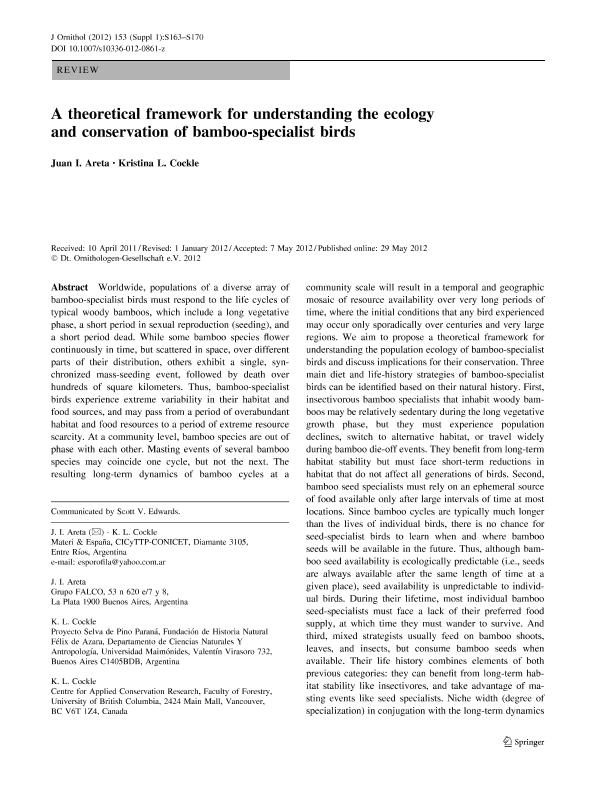Artículo
A theoretical framework for understanding the ecology and conservation of bamboo-specialist birds
Fecha de publicación:
08/2012
Editorial:
Wiley Blackwell Publishing, Inc
Revista:
Journal Fur Ornithologie
ISSN:
0021-8375
Idioma:
Inglés
Tipo de recurso:
Artículo publicado
Clasificación temática:
Resumen
Worldwide, populations of a diverse array of bamboo-specialist birds must respond to the life cycles of typical woody bamboos, which include a long vegetative phase, a short period in sexual reproduction (seeding), and a short period dead. While some bamboo species flower continuously in time, but scattered in space, over different parts of their distribution, others exhibit a single, synchronized mass-seeding event, followed by death over hundreds of square kilometers. Thus, bamboo-specialist birds experience extreme variability in their habitat and food sources, and may pass from a period of overabundant habitat and food resources to a period of extreme resource scarcity. At a community level, bamboo species are out of phase with each other. Masting events of several bamboo species may coincide one cycle, but not the next. The resulting long-term dynamics of bamboo cycles at a community scale will result in a temporal and geographic mosaic of resource availability over very long periods of time, where the initial conditions that any bird experienced may occur only sporadically over centuries and very large regions. We aim to propose a theoretical framework for understanding the population ecology of bamboo-specialist birds and discuss implications for their conservation. Three main diet and life-history strategies of bamboo-specialist birds can be identified based on their natural history. First, insectivorous bamboo specialists that inhabit woody bamboos may be relatively sedentary during the long vegetative growth phase, but they must experience population declines, switch to alternative habitat, or travel widely during bamboo die-off events. They benefit from long-term habitat stability but must face short-term reductions in habitat that do not affect all generations of birds. Second, bamboo seed specialists must rely on an ephemeral source of food available only after large intervals of time at most locations. Since bamboo cycles are typically much longer than the lives of individual birds, there is no chance for seed-specialist birds to learn when and where bamboo seeds will be available in the future. Thus, although bamboo seed availability is ecologically predictable (i. e., seeds are always available after the same length of time at a given place), seed availability is unpredictable to individual birds. During their lifetime, most individual bamboo seed-specialists must face a lack of their preferred food supply, at which time they must wander to survive. And third, mixed strategists usually feed on bamboo shoots, leaves, and insects, but consume bamboo seeds when available. Their life history combines elements of both previous categories: they can benefit from long-term habitat stability like insectivores, and take advantage of masting events like seed specialists. Niche width (degree of specialization) in conjugation with the long-term dynamics of bamboo cycles should determine the degree of nomadism and amplitude of bamboo-specialist population cycles. Nomadism appears to be distributed along a continuum from the temporarily nomad insectivores and mixed strategists to the local and regional nomadic seed specialists. A protected area cannot shelter healthy populations of the most specialized bamboo-seed specialists because they track temporally and spatially unpredictable resources over large temporal and spatial scales. Overall, to effectively protect this ecological system, it is crucial to conserve a network of natural areas capable of providing bamboo in different phases and at different times and places, as well as subsidiary food resources that will allow birds to move away from bamboo patches as they become unsuitable to new, suitable patches. © 2012 Dt. Ornithologen-Gesellschaft e.V.
Archivos asociados
Licencia
Identificadores
Colecciones
Articulos(IBIGEO)
Articulos de INST.DE BIO Y GEOCIENCIAS DEL NOA
Articulos de INST.DE BIO Y GEOCIENCIAS DEL NOA
Citación
Areta, Juan Ignacio; Cockle, Kristina Louise; A theoretical framework for understanding the ecology and conservation of bamboo-specialist birds; Wiley Blackwell Publishing, Inc; Journal Fur Ornithologie; 153; SUPPL. 1; 8-2012; 163-170
Compartir
Altmétricas




